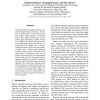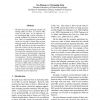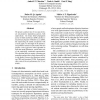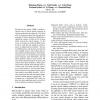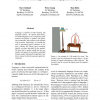EMNLP
2010
13 years 10 months ago
2010
In contrast with the booming increase of internet data, state-of-art QA (question answering) systems, otherwise, concerned data from specific domains or resources such as search e...
EMNLP
2010
13 years 10 months ago
2010
We present PEM, the first fully automatic metric to evaluate the quality of paraphrases, and consequently, that of paraphrase generation systems. Our metric is based on three crit...
EMNLP
2010
13 years 10 months ago
2010
This paper examines tagging models for spontaneous English speech transcripts. We analyze the performance of state-of-the-art tagging models, either generative or discriminative, ...
EMNLP
2010
13 years 10 months ago
2010
In many applications, replacing a complex word form by its stem can reduce sparsity, revealing connections in the data that would not otherwise be apparent. In this paper, we focu...
EMNLP
2010
13 years 10 months ago
2010
Determining whether a textual phrase denotes a functional relation (i.e., a relation that maps each domain element to a unique range element) is useful for numerous NLP tasks such...
EMNLP
2010
13 years 10 months ago
2010
As a prerequisite to translation of poetry, we implement the ability to produce translations with meter and rhyme for phrase-based MT, examine whether the hypothesis space of such...
EMNLP
2010
13 years 10 months ago
2010
We show that jointly performing semantic role labeling (SRL) on bitext can improve SRL results on both sides. In our approach, we use monolingual SRL systems to produce argument c...
EMNLP
2010
13 years 10 months ago
2010
We present a unified view of two state-of-theart non-projective dependency parsers, both approximate: the loopy belief propagation parser of Smith and Eisner (2008) and the relaxe...
EMNLP
2010
13 years 10 months ago
2010
Recurrent event queries (REQ) constitute a special class of search queries occurring at regular, predictable time intervals. The freshness of documents ranked for such queries is ...
EMNLP
2010
13 years 10 months ago
2010
Language is sensitive to both semantic and pragmatic effects. To capture both effects, we model language use as a cooperative game between two players: a speaker, who generates an...

